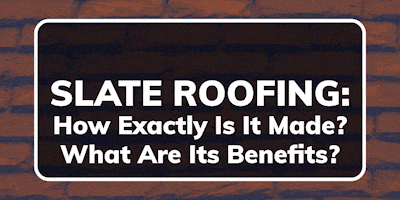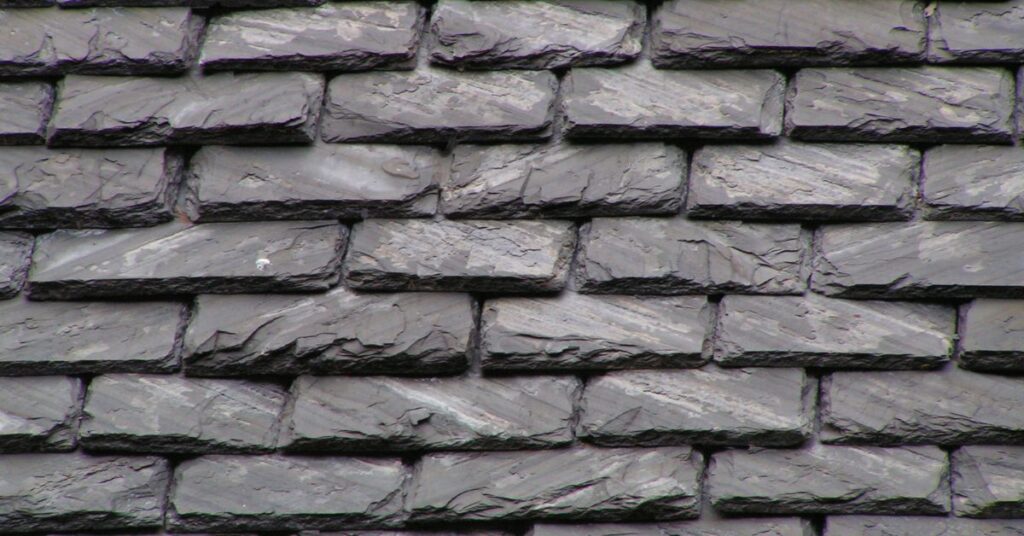Slate Roofing: How Exactly Is It Made? What Are Its Benefits?

The type of roofing material you choose for your home will dramatically impact how well it works, how long it lasts, and various other aspects. With a variety of options available for you to choose from, it can be challenging trying to figure out what will work best for you. To help you make the optimal choice for your residential or commercial property roofing, here’s a closer look at this material. We’ll highlight how slate roofing is made and the advantages that come with using it.
Slate Roofing: How is it Made?
Slate is a premium roofing material prized among homeowners and roofing contractors worldwide. This natural stone material comes from quarries mainly located in Italy, where it has been mined for centuries.
However, it is now sourced locally from Virginia, Vermont, Pennsylvania, and New York quarries. It is one of the world’s oldest types of roofing material. Like metal or terracotta, slate is made up of entirely inorganic matter, making it impervious to natural decay.
A typical slate tile will be cut out in random-width or constant-width templates. Constant-width tiles are designed to give your roof a uniform, formal look, while random-width tiles will result in a more informal, natural aesthetic.

Advantages of Slate Roofing
As we mentioned, slate is one of the most desirable roofing materials in the world. There are plenty of reasons for this, including:
Aesthetic Appeal
Two main qualities of slate make it a beautiful and aesthetically pleasing roofing material. The first is its high mica content, which gives it its unique sheen. Second, is its rough-hewn aspect, which results from the fact that the slate is a sedimentary rock. Such rocks are formed of numerous layers that slice or cleave, like playing cards in a deck.
Combining these two aspects has made this one of the most attractive roofing options in the United States and is sure to increase any home’s property value and curb appeal.
Environmental Impact
Slate is one of the most environmentally-friendly roofing materials available in the USA. This is because it is an entirely natural material without additional treatment or embellishment to serve its purpose. Composite shingles, for example, are petroleum-based products that usually end up in landfills at the end of their relatively short service life.
A slate tile is drastically different because it can be reused for the same purpose after being taken off one building and used differently after grinding it down. Moreover, its extremely long service life means homeowners won’t be forced to discard or replace them after only a few decades.
Longevity
There isn’t any other roofing material that can compete with slate in terms of sheer longevity. Asphalt, wood, and metal roofing can be expected to last a maximum of 10, 40, and 50 years respectively. Meanwhile, slate will comfortably last for more than 150 years without losing its efficacy. Aside from its physical strength, it is also resistant to fire and insect damage.
Longevity is one of the most important elements to consider when choosing a roofing material, not only because of the critical role your roof plays in any property but also due to the high costs of carrying out professional roof installation, repair, replacement, and maintenance.
When you choose slate roofing, you might face a high initial cost, but you will save yourself much more time and money down the road.
Maintenance and Repair of Slate Roofing
For all its durability and longevity, the nature of the slate makes it prone to cracks if struck by sudden sharp impacts. While it is exceptionally hard, it is also somewhat brittle, making it vulnerable to damage from falling tree limbs and other causes of heavy mechanical damage.
On top of this, slate should only be handled by professional roofing specialists with experience working with this roofing material because it’s a heavy material and difficult to walk on without damaging it.
Furthermore, one needs specialized equipment to handle slate effectively, such as rippers, slate hammers, a nail punch, slate cutters, etc. No matter how skilled, operations involving slate aren’t suitable for DIY enthusiasts.
Final Thoughts
Many people consider slate the most attractive, environmentally friendly, and long-lasting roofing material available today. It is suitable for use in all climates. Because of this, you needn’t worry about this no matter where you reside. However, you need to have experienced, dedicated roofing specialists for the best results when dealing with it. Should you live in Norfolk, Virginia, Stevens Roofing is here for you.
Our roofing specialists have the skills, experience, equipment, and dedication to help make your roofing dreams a reality. For all your slate roof installation, repair, replacement, and maintenance roof requirements, contact Stevens Roofing first. You won’t regret it!
Sources
https://www.newhomesource.com/learn/slate-roof
https://www.forbes.com/home-improvement/roofing/what-is-a-slate-roof
https://www.roofingcalc.com/slate-roofing-facts/


